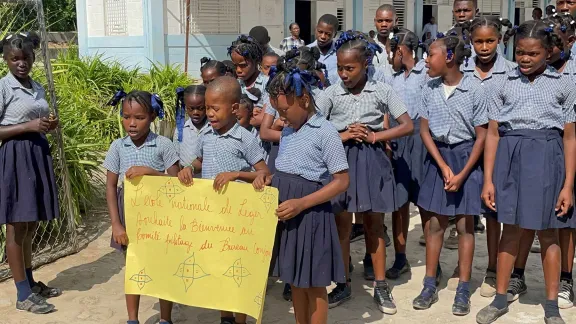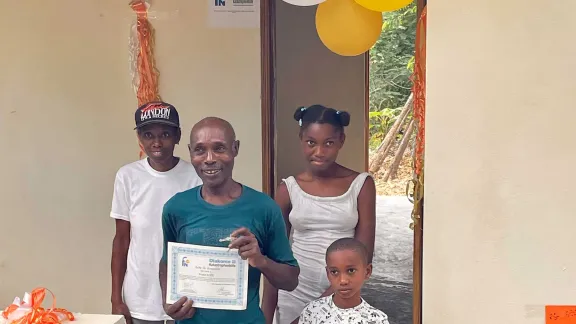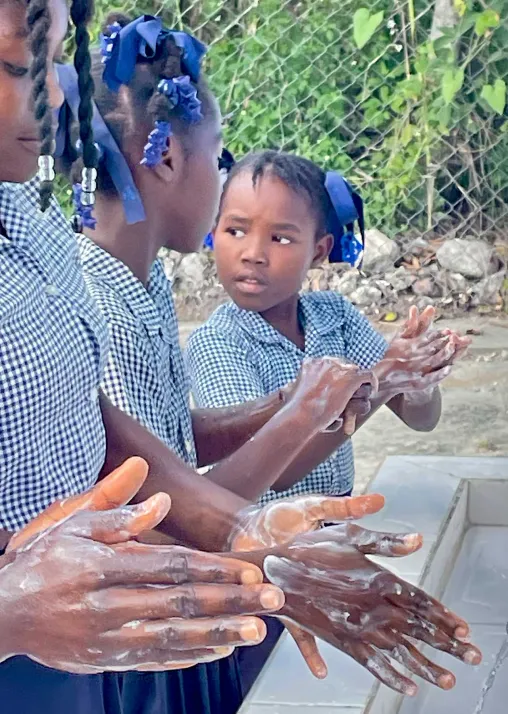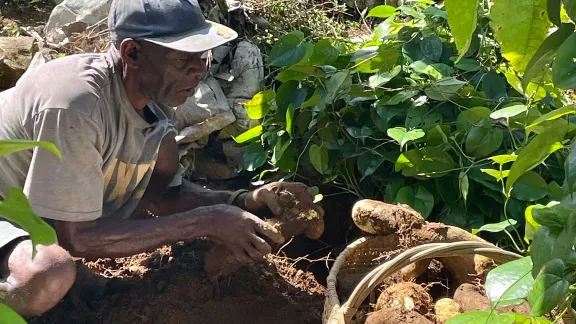The operational context in Haiti is challenging. Lawlessness, the rule of organized criminal groups, economic problems, earthquakes, and extreme weather events continue to destroy livelihoods.

Children at Legere School welcome the LWF visitors. LWF together with parters in the Joint Office rehabilitated water and sanitation in the schools of rural communities in Haiti. Photo: LWF/ P.Raymond
In one of the most challenging operational environments, LWF continues to do humanitarian work
(LWI) - The operational context in Haiti is challenging. Lawlessness, the rule of organized criminal groups, economic problems, earthquakes, and extreme weather events threaten to destroy everything people start building.
The LWF, Diakonie Katastrophenhilfe, and Norwegian Church Aid continue to work under insecure circumstances to serve vulnerable communities. In this interview, LWF Country representative Prospery Raymond talks about the challenges, LWF's main projects, and rewarding moments.
Impact on staff
"The situation in Haiti is very complicated," Raymond says. "Since the assassination of the president, there has been no elected official government. The inflation is high, over 40 percent."
Organized criminal groups, more commonly referred to as gangs, rule the Haitian capital, Port-au-Prince, where LWF has a joint office with DKH and NCA. Every day, there are targeted kidnappings, extrajudicial killings, and gun fights.
"Our staff are very stressed", Raymond says. "We provide transportation so they can come to the office. They all live here in Port-au-Prince with their families." Some had to move because gangs took control of the neighborhood they lived in. LWF provides psychological support to help them cope with the stress.

The Family Pradel, community of Fon Kochin, Grand Anse, received the key to their new house, built by the Joint Office as part of the response to the August 2021 earthquake. Also pictured is the shelter they have been living in for the past two years. Photo: LWF/ M. French
Impact on work
Security challenges do not allow the team to visit the communities they serve as much as they would like, but the work continues, Raymond adds. LWF works with local partners. "Our team managed to go to the field at least once a month to visit our partners, visit the project, talk to the people we serve, and see how we are improving their lives, and I am grateful for that," Raymond says. For security reasons, the team has to fly to remote communities, making the visits expensive and more complicated to organize.

Children wash their hands at Legere school in Cavillon. LWF and partners installed water and sanitation in the school – before , the children had to walk one hour to find safe drinking water. Photo: LWF/ M. French
In the South and Grand'Anse areas, the LWF Haiti team has rebuilt families' homes affected by the 2021 earthquake and rehabilitated school water and sanitation systems. "This is important", Raymond says. "We pumped water from the ground or harvested water on the roofs of schools and public buildings. This year, we put a system into operation that provides potable, safe water for thousands of people, and we will continue to do so in many other areas."

Madeline Dol and her husband, community of Despagne, Grand Anse. Ms Dol received support to develop her smallholding, growing leeks, peppers, yams, herbs, cabbage, plantains, to eat and sell. On one hand, the garden diversifies the family’s income and stabilizes the slopes, preventing landslides during extreme weather. Photo: LWF/ M. French
Building a future
Many projects are about providing a livelihood. LWF has trained communities in the South, Grand Anse, and Southeast of Haiti to start beekeeping and help them sell the honey the bees produce. It also supports mutual solidarity groups, enabling women to start businesses and diversify their income. With another local partner, LWF reconstructs roads damaged by the earthquake. The work is done by locals who are employed in a cash-for-work program.
We were delighted when we saw the creativity of some of those families and how they used the funding.
Prospery RAYMOND, LWF Country Representative Haiti
LWF also helps affected families with cash grants. "We were delighted when we saw the creativity of some of those families and how they used the funding," Raymond says. "It's a little money, around 105 Euro, but they do a lot with it. We also have a microcredit scheme to help communities access revolving funds."
Raymond cites the example of a woman who invested money in her children's education; both son and daughter attend university, and the son recently left to study in the United States. "I'm impressed," Raymond says. "I'm sure it's not just our microcredit system that helped bring this about, but the way the lady presented, it was obvious the LWF microcredit scheme had helped her."


